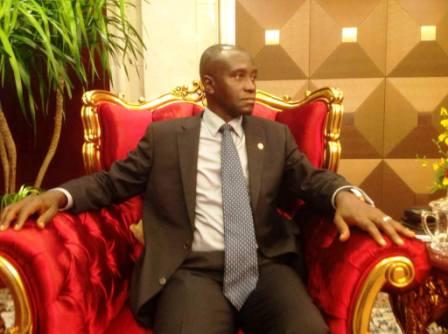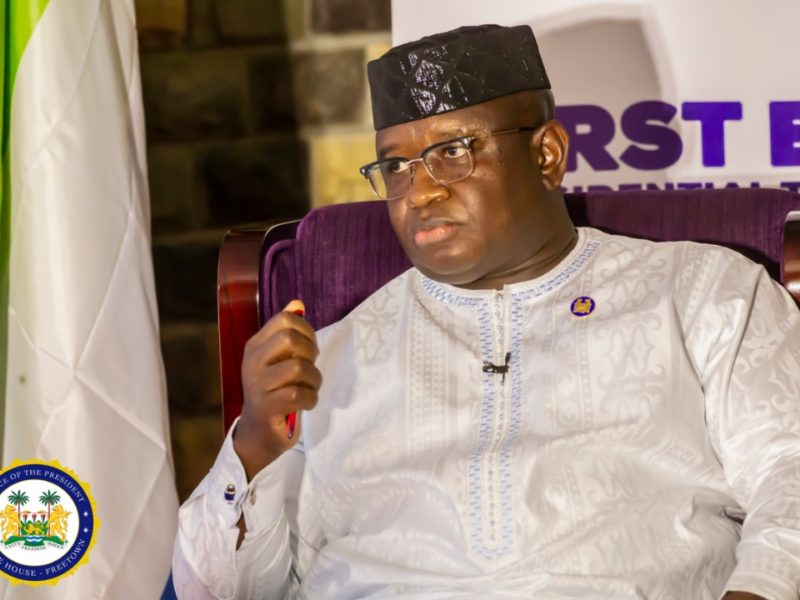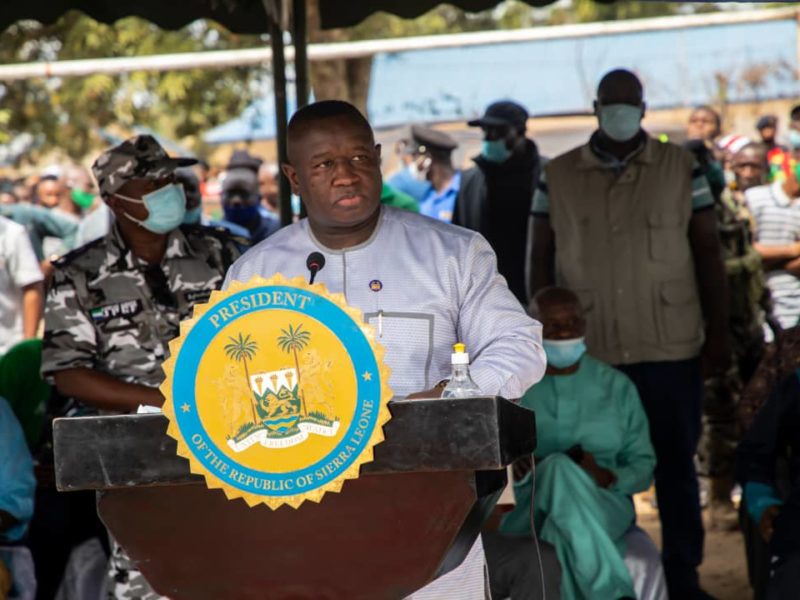Sierra Leone’s Trade Minister on his visit to China, Street Trading, Price Control and Local Content Policy in his country
The name Alhaji Usman Boie Kamara (in photo) is not new in Sierra Leone, especially with the framework of party politics. From being a former Mines Director, to a leading figure in the governing All Peoples Congress (APC) in Sierra Leone, Usman Boie Kamara has been a key player in that small West African state where he is at the moment serving as Trade and Industry Minister. With a daunting task of addressing street trading, and ensuring more industries into the country, Minister Kamara has seen all of these as refreshing experiences.
Politically, he helped in destabilizing the main opposition SLPP by taking votes from them to the APC when he was denied the party leadership and thus joined the APC. His coming to the APC was seen by many as the right decision he made, given his commitment to seeing Sierra Leone’s growth. Known by many as a respected, quite, hardworking but unassuming statesman, Usman Boie Kamara was in the People’s Republic of China on an official function all gearing towards supporting his country’s drive to prosperity, as contained in the document being used by the country’s President, Dr Ernest Bai Koroma to administer and direct the affairs of the state, the Agenda for Prosperity’.
In this interview, I caught up with him in his hotel room few hours prior to his departure for Sierra Leone. He spoke on a range of issues; from his visit to China; his activities so far as Trade Minister; the issue of street trading and price control since he assumed that office few months ago, and plans on developing Sierra Leone’s local content policy. This was how it all went:
You have been in China for close to two weeks, also being part of the President’s delegation. How has it been like?
Well it has been quite good in the sense that I have been here for two purposes; one was to look at the possibility of a 500,000 ton steel plant to be established in Sierra Leone. We have had discussions with a Chinese company, COMPLANT. I led the delegation, comprising the Minister of Water Resources and the Attorney-General. Three of us had discussions together with the Sierra Leonean representative of COMPLANT, Christian Ogoo. We had discussions with top executives of the company and we arrived at an outline in the form of an MOU which will guide us in writing the final agreement later .The ball is now rolling to ensure that the steel plant will be constructed. This is the second steel plant we are trying to construct in Sierra Leone .And this is long overdue in the sense, the country has an abundant iron ore resources and it will be appropriate for us to ensure we try to get added value to iron ore so that things like iron rods can be manufactured in the country which will create employment opportunities for people.
The second purpose was on a visit to Hanan Gouji Headquarters. As per the arrangement we should have a Sierra Leonean and four Chinese on the board, taking into consideration the fact that we own 20% shares in the company. We had a meeting and we discussed operations of the company for the next three years to ensure the company benefits the people of Sierra Leone. I am glad to say we have arrived at an agreement on some issues. The company intends to invest not only in their works at Cline town. As you may know they have built some houses along the beach but they want to move down scale, so that people could benefit from this housing arrangement and we urge them to do that. We guided them to ensure the company becomes profitable as we own 20% of the company’s shares. The company is looking out for areas to invest in the country as it is investing in countries like Zambia, Mozambique and the rest. We have been to a number of their operation areas in the city and they are very good in construction.
I was also part of the Presidential delegation in discussing with companies here in China to see how best we position ourselves in making use of the capital advantage Sierra Leone has with China.
With plans for a steel plant in the country, are we expecting apparent results in the coming months, or few years from now?
Not immediately. We have arrived at an MOU for the steel plant. There is a lot to be done especially in terms of financial agreement and technical drawings, the site for the steel plant and all those sort of things. But for Gouji Investment, that is ongoing and they are now talking about expansion of their operations in the country which is very good for the future of the country. But in steel plant you take into consideration a lot of factors and we are looking at these factors.
Let us now look at your few months as Minister of Trade and Industry. You came in at a time we had crucial issues like street trading, increase in the price of basic commodities, amongst others. How have you been working round the clock to tackle these apparent challenges, also taking into account the political side of issues?
Well, I must say the experience has been refreshing. Once somebody is prepared to learn, and is determined to move the country, then there is always a way and the means to ensure that is done. Take the thorny issue of traders in the street. The Operation WID is being successful since traders are aware of the direction the government is taking and have been cooperating positively with the Freetown City Council (FCC), although there are challenges. I have come in to assist the FCC to ensure that the direction of government in making sure roads are cleared; is achieved. We have met several times with the Mayor and traders; and the Mayor is engaging them from time to time and getting them involved in the process. The President has directed that myself and the Mayor look into these issues once they arise.
But coming to the general ministry, as you know it is a very big ministry that works with all other ministries in the country and we have been interfacing with all of them to ensure the economy is reinvigorated and in that we have been trying our best to look at the manufacturing base we have in a country; the present factories operating and one major problem they have is the question of energy. We have engaged the Energy Ministry to ensure viable companies are given power that will in return create wealth for the country and employment for people. And this is tied up to my visit in China, which is, trying to bring in manufacturing companies for more revenue for the country, through the establishment of a steel factory that will create employment for people and also has a multiplier effect on the populace.
In addition to that, I also signed an MOU with UNIDO in May this year for a four year Country Programme on agri-business and small scale enterprise so as to give them a push. This runs to about $40 million. We have got some of the money from UNIDO to finance some of the projects but we still need more donors and financiers in this direction and we looking up to World Bank, IFC,IMF, AFDB,EU etc., so we could be able to fulfill this Country Programme. This is geared towards building up the agri-business. We will pursue the need to adding value to primary products and this will not only help in gaining knowledge but in increasing wealth of the country and help to improve welfare of the people.
But what about the aspect of price control, even though we all know Sierra Leone runs a free market economy?
When I came in, the first paper I took to cabinet was for the appointment of Trade Monitors. As you know with liberal economy now, we don’t have price control as such but there are issues we are trying to address and one is price control.
We are in the process of employing Trade Monitors and they will work with the Standards Bureau to ensure substandard goods are not brought into the country. They also will be working with other stakeholders to ensure profiteering and other challenges are addressed. The second aspect is to look at the question of giving economic space to Sierra Leoneans. There is an erroneous view that the Citizens Trade Act that was enacted in the 1960s gives Sierra Leoneans the right to command the economy but that has been misused over the years because a lot of the people who you think are Sierra Leoneans have naturalized or taken citizenship.
So we are working on ways to ensure Sierra Leoneans have a stake in the economy and once we arrive at ways of doing that then we can address that issue. You are aware the Ministry has instituted the Local Content Policy. This Policy aims at ensuring that the commanding height of the economy is in the hands of Sierra Leoneans. It lays the basis for the advancement of the Policy by giving preference to the use of local personnel and services and also emphasis would be placed on organizations to give preference to the training of Sierra Leoneans to assume this added responsibility. The Ministry is now working on ensuring that the Law on Local Content Policy is promulgated by the end of this year. This would give teeth to the Policy.
So we are trying to energize Sierra Leoneans. In fact we are in the process of disbursing Le2 billion at a 5% interest to Sierra Leoneans to help them develop their small scale businesses. One of the components of the country program I signed with UNIDO has to do with small scale enterprises as well. We want to empower our people since major blockage of their expansion is money. So we are trying to get affordable loans for them. We gave out loans last year and they have been paying and we signed an agreement with Commercial Bank last year. But again, the major components of the UNIDO Country Programme are agribusiness, SME Development especially for the Youths and Women and Skills training for young people across the country. This programme aims to give a boost to SMEs in terms of availability of finance to women and youths. The programme would also lay emphasis on skills training for young people to address the question of unemployment and job creation.
Yes, there comes in the question of the commercial banks when you mention loans. What have they been doing?
Yes, this is a unique thing in the sense, before now, people take loans and they default. So for now, the banks manage the loans and they deal with the people directly. We will ensure more loans are given to people and this is one way of reducing poverty and making the economy stronger. If you listen to economic indices you will hear that Sierra Leone has got a good index and doing well in the “Doing Business” ranking but now we need to translate that to the man in the street.
That “Doing Business” ranking. Sure Sierra Leone has been doing well. But how have you been working with institutions like NRA, the Clearing and Forwarding Agencies, amongst others to ensure, we maintain or uplift that ranking?
That is paramount and it has some link with the MCC-the compact which we have won. We are working with all stakeholders like the Office of the Administrator-General, Law Officers Department, and Customs etc but as you know, when dealing with different people and different departments, you have to exercise patience as not all will be responsive at a given time. But as the President said, this is an important sector in the ministry and we have to keep our eyes focused to ensure we don’t drop in our ranking as well as try to go double digits in the next few years in doing business and it is achievable.
We need to address issues especially at the Port and you must have heard about problems recently at NRA and these are issues we have to guard against and I have set up a committee comprising of people from Ministry of Transport and Aviation to look at the port since that is one area that militates against our ranking. We have a good cooperation with them and they have been working with other stakeholders to ensure we reduce the time to clear goods, which has an impact in doing business ranking.
Another area we have concluded is the SLPMB. It is now an Act and we are now working with the National Privatization Commission on that. Another issue is addressing the issue of rice importation in the country to ensure that it is affordable. We are going to sign an agreement with the Ministry of Agriculture and Food Security and work closely together to make sure rice is not only affordable but available.
But can you say you have been enjoying great political support from the presidency?
Yes, the President has been very supportive. He has always been concerned about the welfare of the people and is giving full support to all ministries to ensure the Agenda for Prosperity is realized.
You helped in destabilizing the main opposition SLPP by taking votes from them to the APC when you joined the APC. You must be enjoying your stay in the APC. Right?
One thing in life is, you must be guided by your conviction and I have always stood for the advancement of the country. That is what I do in politics. I work with people who try to advance the welfare and people of the country. That is why I found it easy to move from my former party to the APC without any problem. The difference between the two parties is that in the APC, the people have the interest of the country more than those who think they are PhD holders. They are more interested in the advancement of the country than those who think they are intellectuals. I feel more at home with people who have the interest of the country at heart.
Do you see your party in governance for the next decades?
It all depends on performance because people now understand that you have to perform, not just talk, but ensure people’s lives change by working with them. And that is what we are doing as a political party. We are working towards the Agenda for Prosperity which is for all of us, whether you are a diplomat out of the country or working in the country, you are a Sierra Leonean, and we must move in that direction to make sure that in the next 15 years we become a middle income country where the basics are affordable.
Stay with Sierra Express Media, for your trusted place in news!
© 2013, https:. All rights reserved.






